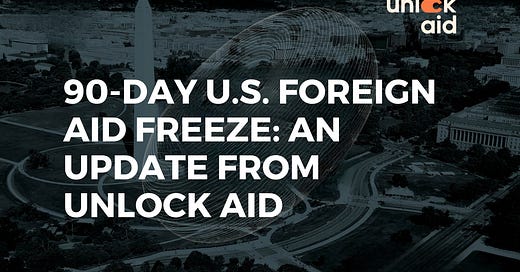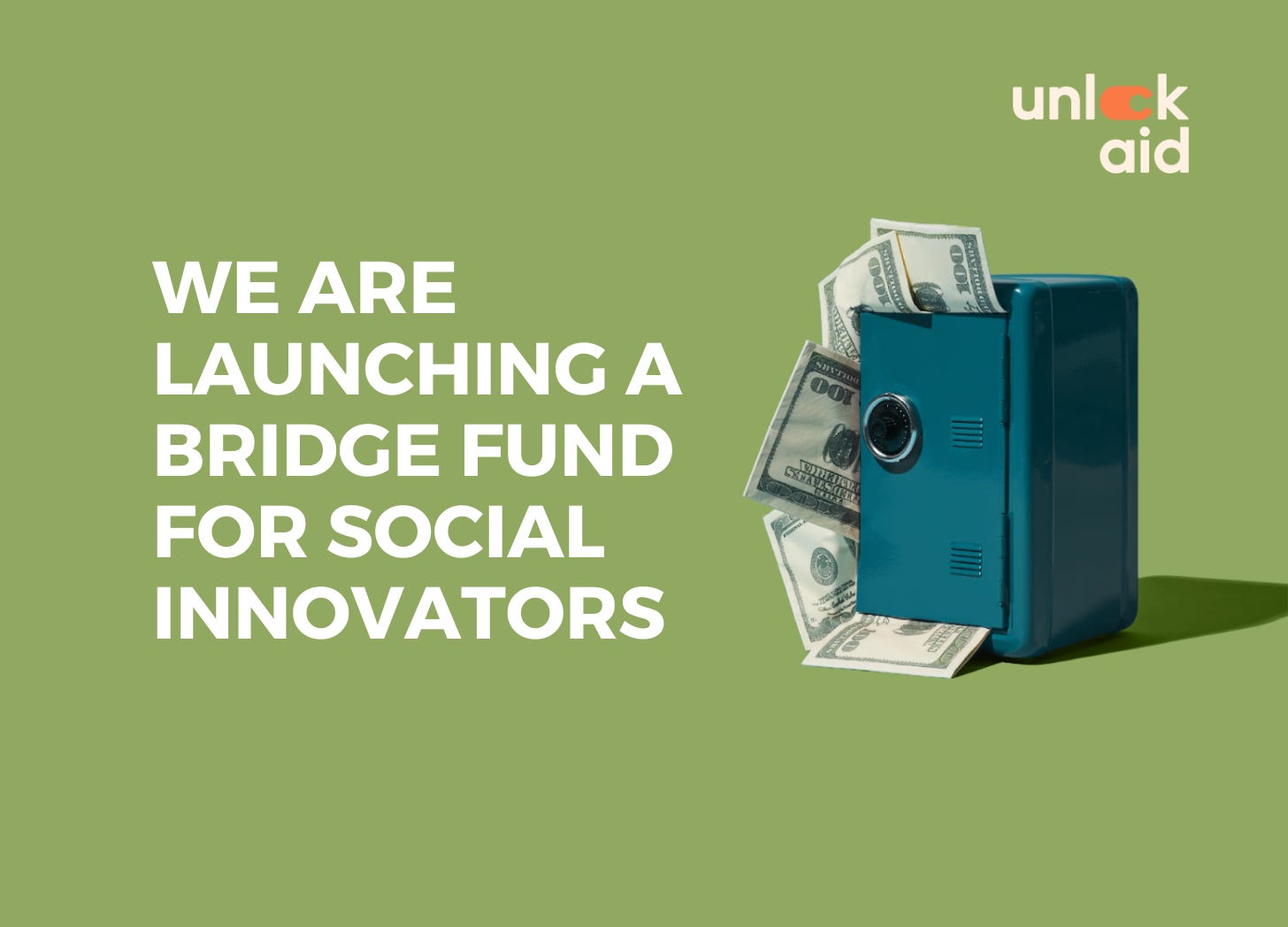90-Day U.S. Foreign Aid Freeze: An Update from Unlock Aid
Why U.S. foreign aid matters, clarifying statements on social media, and launching a bridge fund to support our community
Dear Unlock Aid community,
The past two weeks have created extraordinary upheaval for U.S. foreign assistance, the United States, and its partners around the world.
There’s no question about it: U.S. foreign assistance investments make the United States and its partners stronger, more secure, and more prosperous.
We can strengthen the U.S. approach to foreign assistance so that it is more equipped to confront the scale of the 21st-century challenges that face the United States and its partners. However, we are concerned that abruptly stopping all U.S. foreign assistance creates significant risks.
Here are just two examples that show how:
This weekend, officials in Uganda confirmed an Ebola outbreak in Kampala, the country’s largest population center. In normal times, the U.S. government would mobilize rapidly to work with Ugandan officials to determine the size of a potential outbreak and control it to ensure it doesn’t spread further – including to the United States. But as a result of the stop-work order, U.S. foreign assistance in the country has come to a screeching halt.
Critical life-saving programs, such as the President’s Emergency Plan for Aids Relief (PEPFAR) and the President’s Malaria Initiative (PMI), are also in limbo. On February 1, Secretary of State Rubio issued a waiver to allow vital PEPFAR programs to continue. However, we are hearing through our community that organizations that implement PEPFAR programs have yet to receive explicit instructions from U.S. officials whether they are covered by the waiver and if they may resume their operations. The waiver also did not include PMI programs. Unless this is immediately resolved, untold numbers of children, mothers, and others will not be able to obtain vital medicines, many mothers will transmit HIV to their newborns, and we risk seeing a rapid resurgence of epidemics in diseases that we had largely gotten under control.
What now? Secretary Rubio needs to immediately issue instructions to his staff to explicitly authorize PEPFAR implementing organizations to resume their work without delay. He also needs to lift the stop-work order, especially for all other programs that provide life-saving aid.
A complex media environment
Online influencers and many U.S. officials are also sharing false, debunked, sensationalized, or mischaracterized information about U.S. foreign assistance, which is distorting Americans’ understanding about the importance of these investments.
Dozens of examples abound. As some of you may have seen, this weekend, a number of influencers and officials shared a post that takes out of context a statement made by our co-executive director to PBS News Hour regarding USAID’s locally-led development strategy to shift 25 percent of agency funding to local organizations. During that segment, our co-ED shares that fewer than 10 percent of the agency’s funding as of FY23 goes directly to “local communities,” referring to local partners and organizations that receive and implement U.S. foreign assistance programs. A graphic developed by PBS News Hour that aired during the segment illustrates that point (see below).
However, various officials and online influencers have since mischaracterized that statement to imply that the other 90 percent is used for illegal purposes, wasted, or that just 10 percent of funding is having an impact. That’s false and a misrepresentation of the facts. In addition to locally-registered groups, other actors also receive funding from USAID to provide assistance.
To be clear: Shifting more U.S. foreign assistance funding to local, frontline actors is a more cost-effective and sustainable way to invest. Spending in this way builds countries’ self-reliance and reduces dependencies on U.S. foreign aid. Those organizations and leaders closest to the challenges are also closest to the solutions. These are among the reasons why directing a greater share of U.S. foreign assistance to local and other non-traditional partners was also a priority during the first Trump Administration, and it’s why it should remain a priority during this 90-day review period.
We’re raising a bridge fund to support our community
This is a difficult moment for many organizations in our coalition and for the communities they serve, but the important work must continue.
That’s why we’re teaming up with a number of groups to raise a bridge fund to enable high-impact organizations that have been affected by the stop-work order to continue their operations to serve impacted communities. We expect to share next steps with organizations that have already applied for bridge funding by the end of this week.
Funders, we need your help. If you work at a foundation, you’re a high net-worth individual, or you know someone who is, and you’d like to help, please click here to get involved with this initiative. We’re putting together a consortium of funders big and small to support high-impact organizations continue operations during this 90-day pause.
A lot is happening, all at the same time. We remain open to working with anyone who wants to work with us to build a better system.
To Progress,
Unlock Aid
P.S. If you’re available to join us in person on February 19 or February 20 in Washington, DC, please click here. We haven’t put together our plan for the day just yet, but we know we need to bring our coalition together to talk strategy, meet with lawmakers, and work together to shape the future of U.S. foreign assistance. Let us know if you can join.





